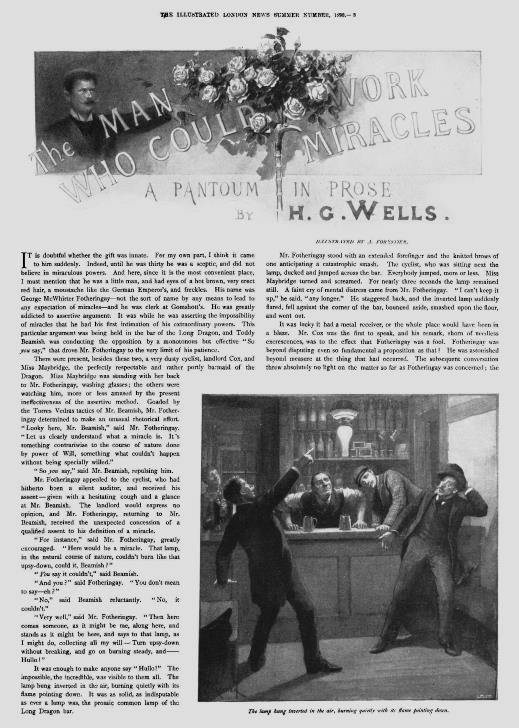The Man Who Could Work Miracles
- by H. G. Wells
- Short Story
- Adults
- Definite Time Travel
- English
- ”The Man Who Could Work Miracles: A Pantoum in Prose” by H. G. Wells, Illustrated London News, Summer 1898.
When George McWhirter Fotheringay discovers that he can work miracles by sheer force of will, the results are wont to bring unexpected consequences, leading to one final miracle that invokes time travel.
—Michael Main
As he struggled to get his shirt over his head, he was struck with a brilliant idea. “Let me be in bed,” he said, and found himself so. “Undressed,’ he stipulated; and, finding the sheets cold, added hastily, ’and in my nightshirt—ho, in a nice soft woolen nightshirt. Ah!” he said with immense enjoyment. “And now let me be comfortably asleep . . .”

Variants
(1)
- ”The Man Who Could Work Miracles: A Pantoum in Prose” by H. G. Wells, Illustrated London News, Summer 1898.. . . . . . . . . . . . . . . . . . . . . . . . . . . . . . . written by traditional storytellers
Translations
(1)
- Japanese.
“奇蹟を行う男” [Man doing miracles], as by H・G・ウエルズ, in H・G・ウェルズ短篇集 I: 来たるべき世界の物語 (早川書房, September 1961).
Derived Works
(2)
- The Man Who Could Work Miracles by Lajos Biró, directed by Lotar Medes and Alexander Kroda (23 July 1936).
- Absolutely Anything by Terry Jones and Gavin Scott, directed by Terry Jones (12 August 2015).
Indexer Notes
(1)
- Publisher—We have no firsthand confirmation of how the publisher was listed for The Illustrated London News in 1898 (or even if there was a masthead). Wikipedia lists William and Charles Ingram as the managing directors during this period, but we hesitate to list them as the official publisher in our records.
